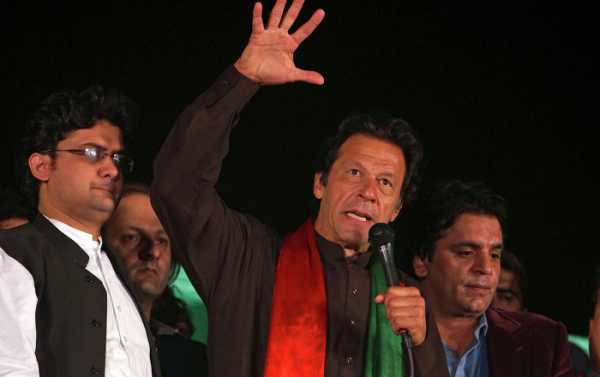
Citizens of the world’s sixth-largest nation went to the polls today in nationwide elections to select their next representatives and government. Over 105 million Pakistanis are eligible to vote, but Pakistan’s military casts a long shadow over the political system and some wonder if their votes will be counted.
Radio Sputnik’s Loud & Clear spoke Wednesday with Marvin Weinbaum, the Scholar-in-Residence and director of the Middle East Institute’s Center for Pakistan and Afghanistan Studies, about how the election seems to be turning out and what it means for Pakistan.
Parties will have to win 137 of the 342 seats in the National Assembly, the lower house of the country’s parliament, in order to form a government. If they cannot win an absolute majority, they must form a coalition government with other parties in order to reach at least 137 MPs.
With Al Jazeera projecting that Imran Khan’s PTI [Pakistan Tehreek-e-Insaf, or Pakistan Movement for Justice] would carry between 94 and 102 seats in parliament, the future of the ruling PML-N [Pakistan Muslim League — Nawaz], led by Nawaz Sharif, hangs in the balance.
”I don’t think they can come back from something like this,” Weinbaum told hosts John Kiriakou and Brian Becker about the Sharif family, who are closely associated with PML-N. “And in any event, they had been sort of written out of Pakistan’s public life by being first removed from office and then from ability to hold party office, and most recently, [Sharif] being sentenced to 10 years, along with his daughter, at seven years, to prison.”
Nawaz Sharif was removed from office in July 2017 following revelations that he and members of his family had been involved in corrupt dealings, as was demonstrated by the 2016 Panama Papers leaks, Sputnik reported. Sharif and his daughter, Maryam, were arrested after returning to the country on July 13, having been sentenced earlier this year to 10 years and seven years in prison, respectively, for their crimes.
But could the party survive without Nawaz Sharif? “If it does, then he could have influence on it, but the way things are shaping up now… it looks like the party now has been roundly defeated.”
Khan’s PTI is leading polls in 111 national assembly constituencies, followed by PML-N in 68 constituencies, the Times of India’s live feed of the results said as of press time.
Weinbaum noted that the PTI was the party that pushed to deprive Sharif of his prime ministership after the Panama Papers, but that Khan and his party were only able to do that because they had the military’s support. The Pakistani military is “an institution of the country which has the respect of most Pakistanis. They are viewed as less corrupt — except when they’re in power, they get that charge thrown at them,” the scholar told Sputnik earlier this week.
Weinbaum noted on Monday that the military “have always been in a position, working through others… they still have this ability to influence politics and influence elections.” He also noted that it was widely felt that during the investigation and trial of the Sharifs, the military was working closely with the judiciary to ensure that “there would be a finding by the courts against him with heavy penalties,” which made Khan’s crusade possible.
The scholar noted that “for some time now, that the military has seen the PTI, Imran Khan’s party, as a way in which to bring down the PML-N, which it has had long feelings of enmity toward.” However, because of the arrest of Sharif, the PML-N didn’t go into the election with the momentum the PTI had, so the military didn’t have to interfere.
But it’s not enough to explain Sharif’s downfall: why would millions of Pakistanis vote for Khan?
Weinbaum said that what really seems to count in Pakistan right now is the sense that “he represents change and we need change.” That’s a strong motivation for voters who view him as clean, in the sense that no major scandal has been attached to him.
However, Khan has also supported other “old style” corrupt politicians, which has raised some eyebrows, and he has been challenged by folks in his own party who thought he didn’t represent the party’s image.
Khan basically said “we gotta win, that’s what really counts,” Weinbaum said.
As the scholar predicted Monday, the other major parties that are losing have alleged vote rigging.
Nawaz’s brother, Shehbaz Sharif, who now leads PML-N, said his party rejects the election results due to “manifest and massive irregularities.”
Likewise, Bilawal Bhutto Zardari of the Pakistan People’s Party noted with suspicion the delay in announcing the first set of official results.
By 4 a.m. Thursday, two hours after a result was expected to be announced, only 37 percent of the votes had been counted, the Guardian noted. Pakistan’s chief election commissioner, Sardar Raza Khan, said he did not want to mislead anyone by giving an exact time for when all results would be out.
Raza Khan rejected charges of election rigging in a news conference early Thursday morning, saying the process had been completely “fair and transparent,” the Guardian reported. “There is no stain on the electoral process… Why do you think the five political parties [who have alleged rigging] are speaking the truth and the election commission is not? There is no problem with the results. Wait for the results.”
“I don’t believe the military wanted to see a strong plurality on the part of the PTI,” Weinbaum said. “I think they would have been happy with a very fragile coalition that can be put together.”
The scholar said it won’t be difficult for Khan to assemble such a coalition, either: smaller parties and religious parties can easily be won over by him, plus there are also the independent MPs, who are self-serving and will “go wherever power is to protect their own interests in the next regime.”
Sourse: sputniknews.com






